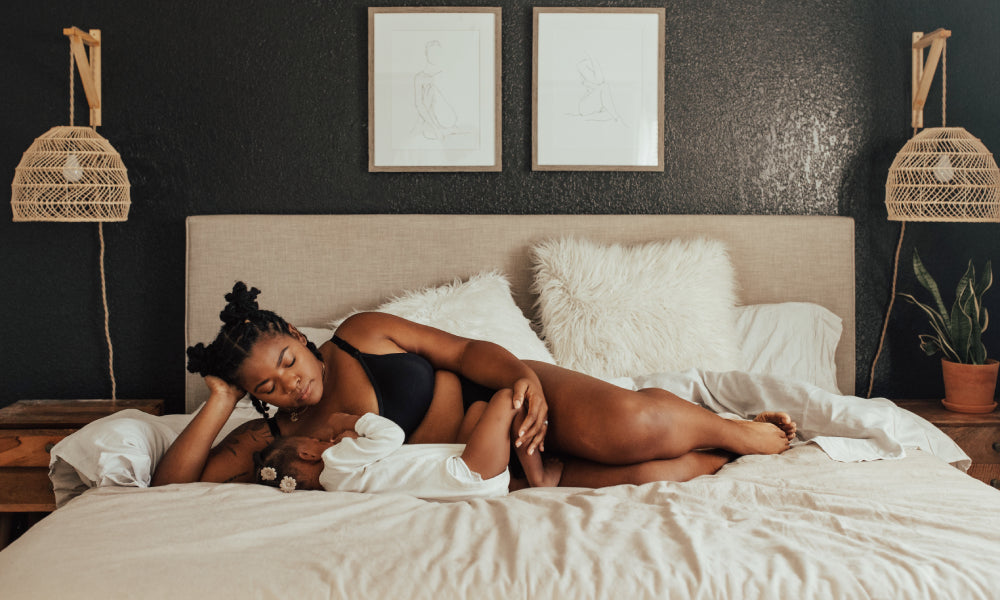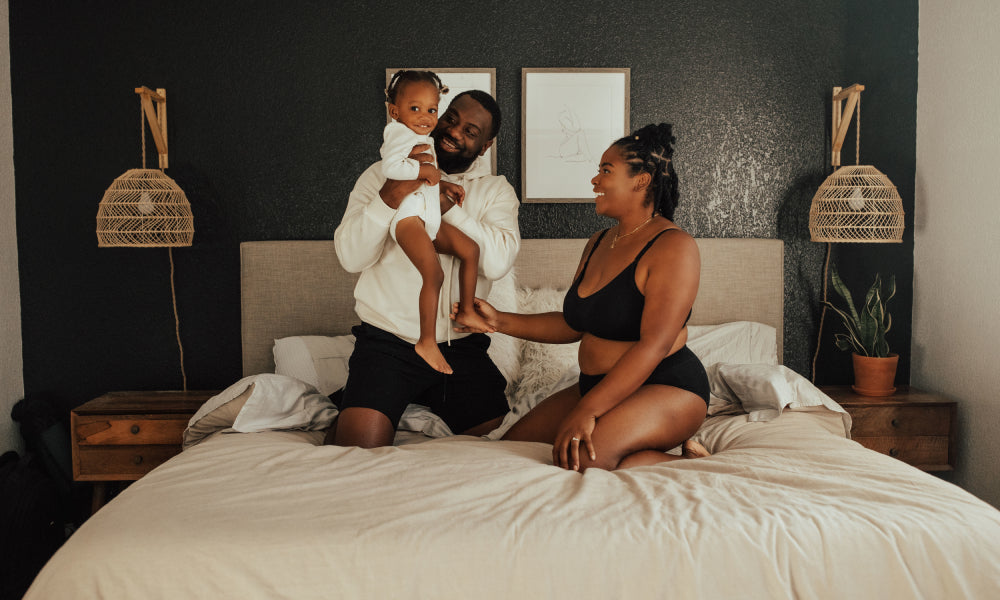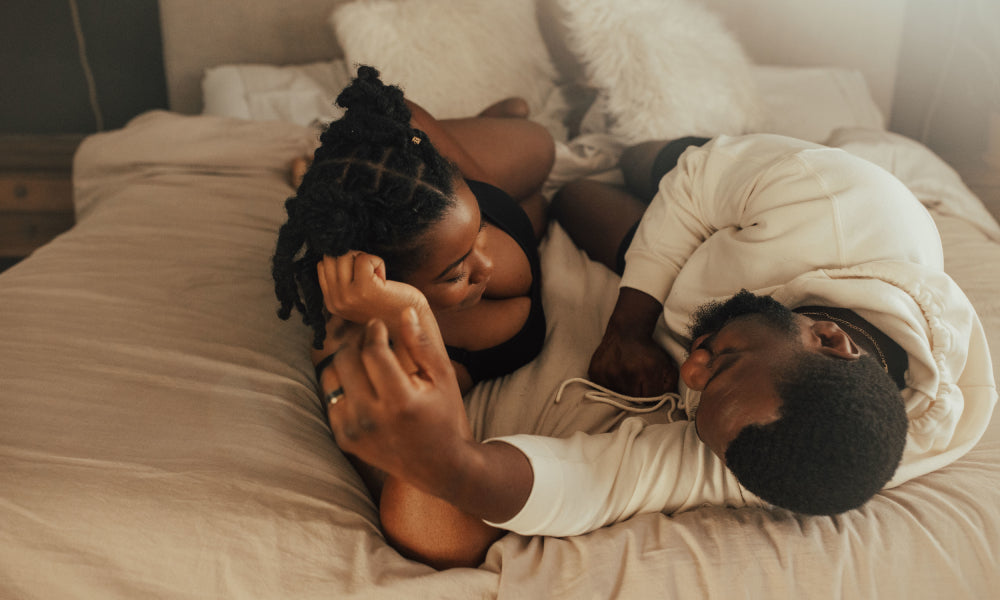The Photographer Capturing the Magic of Black Births
If the old adage "a picture is worth a thousand words" is true, surely, a photo of a human life being brought into the world is worth...millions?
For birth photographer, Carmen Bridgewater, it's about transforming a potentially traumatic moment into a beautiful one. Beyond the daunting task of capturing these sacred moments of birth — and producing images that will be cherished for a lifetime — their work serves a greater purpose. Their lens is also used to educate, empower, and subvert.
Scrolling through their Instagram feed for the first time, we were taken aback by the raw and candid essence of their process — we couldn't wait to get into the nitty-gritty of what it's like to be a birth photographer.
As a photographer, what drew you to capturing birthing experiences?

(Image by Carmen Bridgewater, who is wearing the BlissFit Leakproof Nursing Bra and Cotton Super Leakproof Boxer Brief)
My photography has always followed the natural ebb and flow of my personal life. While in college, I shot many graduation portraits. After I graduated and got married, I shot many weddings and engagement photos. A few years before getting pregnant and giving birth to my own child, I felt a pull towards motherhood portraits and the genre of birth photography.
As any Google search rabbit hole begins, researching birth photography led me to the treacherous statistics that face Black birthing and postpartum people. I went through the usual grieving process, first becoming sad, then angry, and then earnestly wanting to be a part of the solution.
I noticed that it was hard to find positive images of Black people birthing and there were very few Black photographers in the birth genre. I wanted to use photography to show Black people that they have options and can be the author of their own birth stories.
The work you do is so vital in demystifying birthing journeys. How does it feel to be part of these raw and intimate moments?
Sometimes I am documenting a moment so intimate and so emotion-filled, I feel like I shouldn’t be in the room. On the other hand, I think about what makes this work so invaluable. I am invited into these birth spaces to capture the moments otherwise left unseen — to bear witness to the magic and miracles.
"I wanted to use photography to show Black people that they have options and can be the author of their own birth stories."
With every birth I capture, I am reminded of the amount of trust placed in me to not just capture pictures but to tell a full story of pain, perseverance, triumph, and then joy.
What have you learned from your work as a birth photographer?

(Image by Carmen Bridgewater, who is wearing the BlissFit Leakproof Nursing Bra and Cotton Super Leakproof Boxer Brief)
Living, breathing, and creating in this space has opened my eyes to the beauty of informed decision-making in birth and I am more eager than ever for all Black birthing people to experience its joys.
I have attended births where the birthing person did not take a childbirth education class or hire a doula and didn’t fully understand their rights. As a result, their experiences left them with many scars, physically and emotionally.
I have learned that through photography, I can essentially educate people about their birthing options. A lot of people who follow me on social media (initially) don’t know what water birth is or what roles doulas and midwives play. Photography is, if nothing else, a conversation starter.
Do you think photography can empower birthing people to cultivate their own unique birthing experiences?
I do! When Black people see themselves represented in beautiful birth imagery, they are able to close their eyes and place themselves there — in a safe space where they are surrounded by support and genuine care.
They begin to read and ask questions about how they, too, can have a peaceful, trauma-free experience. Our bodies have been birthing babies since the beginning of time and, sometimes, we forget what miracles they can perform — largely without the help of modern medicine. My work brings people back to that reality. It is my activism.
How do certain implicit biases disproportionately affect Black birthing people and families?

(Image by Carmen Bridgewater, who is wearing the BlissFit Leakproof Nursing Bra and Cotton Super Leakproof Boxer Brief)
Back in 2019, I was 7 months pregnant on a trip to the mall to find some maternity clothes to fit my ever-growing body. As I walked up to the door, I saw a white man was holding the door for his family. When I reached the door, he dropped the door on me as I was about to walk through it.
I don’t believe that he meant harm. I actually think it’s more about what he didn’t think. He didn’t think I needed someone to hold the door for me. As we know, Black women are plagued with the “strong Black women” schema and it doesn’t just go away when we are pregnant.
Because of implicit bias, non-Black people have trouble empathizing with us, and that carries over directly into our birthing experiences — from our prenatal appointments to our postpartum care. This phenomenon is further amplified for those of us who have more fat on our bodies and those with disabilities.
"My work brings people back to that reality. It is my activism."
Imagery is so powerful and has the magic to induce all sorts of feelings: empathy, compassion, and understanding just to name a few. What I love about birth photography is that it gives us a non-invasive peek into a sacred space we would otherwise not ever enter. I do not do this work to end or address racism, I do this work for my clients.
However, it’s a bonus to know that my work could have the power to change the hearts of non-POC as well. Imagine what a different world we would live in if we were able to really see each other as complex beings?
As a new mom (congrats!), how would you describe your own personal birthing journey?

(Image by Carmen Bridgewater, who is wearing the BlissFit Leakproof Nursing Bra and Cotton Super Leakproof Boxer Brief)
My birthing experience was rich! As a birth-worker, I had to make the decision to leave all that I had ever witnessed at other births at the door and have my own experience. I planned my birth like a vacation.
I wanted to give birth in a beautiful location so I toured birth centres and met with their midwives. I wanted my loved ones with me so I picked a team of my immediate family members to support me and assigned each one a role. I even decided what yummy meal I wanted to eat after and had my dad pick it up after the baby made her debut.
I labored for about 7 hours before giving birth in the water to a seven-pound baby. Having my birth portraits to look back on was so healing and such a beautiful way to make peace with my journey to motherhood: the good, the bad, and the glorious.
Carmen Bridgewater is a photographer, videographer, and birth-worker based in Fort Worth








